Remembering Bastogne and Brigadier General McAuliffe
Raise a glass with me today and offer a toast: "NUTS!"
The Battle of the Bulge/Ardennes Offensive of 1944
Hitler launched his last offensive on December 16, in the Ardennes, on a scale much greater than his 1940 offensive in the same place against the French Army. He achieved complete surprise…
The surprise was achieved, like most surprises in war, because the offensive made no sense…. because the defenders were guilty of gross overconfidence…. (and) because the attackers did a good job of concealment and deception.
The allies were also badly deceived about the German will to fight, the German material situation, Hitler’s boldness, and the skill of German officers in offensive maneuvers (the American generals in the Allied camp had no experience of defending against a German offensive).
The result of all this was the biggest single battle on the Western front in World War II and the largest engagement ever fought by the U.S. Army. The human losses were staggering: of the 600,000 American soldiers involved, almost 20,000 were killed, another 20,000 captured, and 40,000 wounded. Two infantry divisions were annihilated; in one of them, 7,500 men surrendered, the largest mass surrender in the war against Germany. Nearly 800 American Sherman tanks and other armored vehicles were destroyed. (Stephen Ambrose, Band of Brothers 172-173)
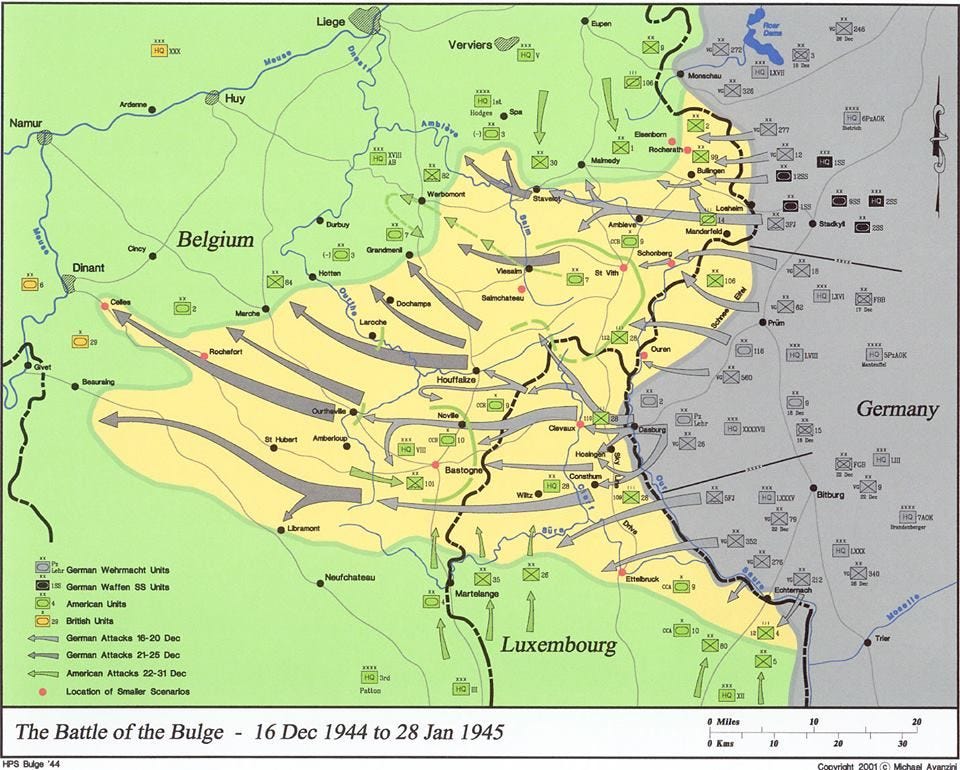
Hitler had not only counted on surprise, but on a slow allied response. But Eisenhower acted quickly and decisively. Ambrose continues:
On the morning of December 17th, Eisenhower made the critical decisions of the entire battle, and did so without consulting anyone outside his own staff. He declared the crossroads city of Bastogne as the place that had to be held no matter what. (Bastogne is in a relatively flat area in the otherwise rugged hills of the Ardennes, which is why the roads of the area converge there.) Because of his offensives north and south of the Ardennes, Ike had no strategic reserves available, but he did have the 82nd and 101st resting and refitting and thus available. He decided to use the paratroopers to plug the holes in his lines and to hold Bastogne…. the Americans had thousands and thousands of trucks and trailers in France. They were being used to haul men, material, and gasoline from the beaches of Normandy to the front. Ike ordered them to drop whatever they were doing and start hauling his reinforcements to the Ardennes.
The response can only be called incredible. On December 17 alone, 11,000 trucks and trailers carried 60,000 men, plus ammunition, gasoline, medical supplies, and other material, into the Ardennes. In the first week of the battle, Eisenhower was able to move 250,000 men and 50,000 vehicles into the fray. This was mobility with a vengeance. It was an achievement unprecedented in the history of war. Not even in Vietnam, not even in the 1991 Gulf War, was the U.S. Army capable of moving so many men and so much equipment so quickly. (Band of Brothers 174)
Troops moved out quickly. Most had not received their issue of winter clothing. Ammunition was limited to what the men had saved, as their rest camps had no ammunition depots. The 101st went without its Commander, Major General Taylor, who was back in the United States attending a conference on the future of airborne divisions. The deputy commander, Brigadier General Higgins, was in England on business. Command of the 101st was in the hands of Brigadier General Anthony McAuliffe, the division’s artillery commander.
BGen. McAuliffe did not know where his division was headed when it departed Mourmelon on the night of December 18th. While on the road, word came down that the 101st would head to Bastogne, and the 82nd to St Vith.
The 101st arrived in Bastogne and quickly found itself engaged in heavy fighting. By the night of December 21st, Bastogne was surrounded. The siege had begun.
Ambrose again:
On December 21, it snowed, a soft, dry snow. It kept coming, 6 inches, 12 inches. The temperature fell to well below freezing, the wind came up, even in the woods. The men were colder than they had ever been in their lives. They had only their jump boots and battle dress with trench coats. No wool socks, no long underwear. Runners went into Bastogne and returned with flour sacks and bed sheets, which provided some warmth and camouflage. In the foxholes and on the outposts, men wrapped their bodies in blankets and their boots in burlap. The burlap soaked up the snow, boots became soggy, socks got wet, the cold penetrated right to the bones. Shivering was as normal as breathing. The men looked like George Washington’s Army at Valley Forge, except that they were getting fired upon, had no huts, and warming fires were out of the question. (Ambrose 181)
At 1130 on December 22, four German soldiers approached the American lines waving white flags, carrying this message:
December 22nd 1944
To the U.S.A. Commander of the encircled town of Bastogne.
The fortune of war is changing. This time the U.S.A. forces in and near Bastogne have been encircled by strong German armored units. More German armored units have crossed the river Ourthe near Ortheuville, have taken Marche and reached St. Hubert by passing through Hompre-Sibret-Tillet. Libramont is in German hands.There is only one possibility to save the encircled U.S.A troops from total annihilation: that is the honorable surrender of the encircled town. In order to think it over a term of two hours will be granted beginning with the presentation of this note.
If this proposal should be rejected one German Artillery Corps and six heavy A. A. Battalions are ready to annihilate the U.S.A. troops in and near Bastogne. The order for firing will be given immediately after this two hours' term.
All the serious civilian losses caused by this artillery fire would not correspond with the wellknown American humanity.
The German Commander
When told of the arrival of the German officers, BGen. McAuliffe responded as follows: (as accounted by his nephew Kenneth McAuliffe, Jr, here)
The Division Operations Officer, Lt. Col. Harry Kinnard recalled that McAulliffe initially asked, "They want to surrender?" Moore told him, "No sir, they want us to surrender." McAulliffe arose and erupted in anger, which shocked those looking on. He took the paper, looked at it, said "Us surrender, aw nuts!" and dropped it on the floor.
BGen. McAuliffe then left HQ on other business. Upon his return, he was informed that the Germans were waiting for a formal reply.
Inside, in the presence of his staff, McAulliffe wondered aloud, "Well, I don't know what to tell them." At that point, Kinnard said, "What you said initially would be hard to beat." McAulliffe asked "What do you mean?" Kinnard, said, "Sir, you said nuts." All members of the staff enthusiastically agreed, so McAulliffe wrote it down on a message pad and said, "Have it typed up."
The Germans messenger didn’t quite know what to make of this reply. Colonel Bud Harper (CO of the 327th) and PFC Premetz (a German-speaking U.S. Army medic) tried to explain it to them as they escorted the Germans back to their lines:
The blindfolds were removed and the Germans opened and looked at the reply. They asked, "What does this mean?" They obviously didn't understand the American slang. Harper and Premetz discussed how to explain it. Harper suggested, "Tell them to take a flying s**t!" Premetz thought about it, then straightened up, faced the Germans and said, "Du kannst zum Teufel gehen." He told Harper it meant "You can go to Hell." Then Harper said, "If you continue to attack, we will kill every goddamn German that tries to break into this city." Henke replied, "We will kill many Americans. This is war." Harper then said, "On your way Bud, and good luck to you." After Henke translated, the major acknowledged. They saluted and the Germans started to walk away. Harper angrily called out to them, "If you don't know what I am talking about, simply go back to your commanding officer and tell him to just plain, 'Go to Hell'."
BGen McAuliffe shared this event with his troops in a Christmas Eve letter:

Two days later, the lead elements of Patton’s 3rd Army reached Bastogne, breaking the siege. Along the way it continued to liberate many small towns and villages, sometimes for the second time.

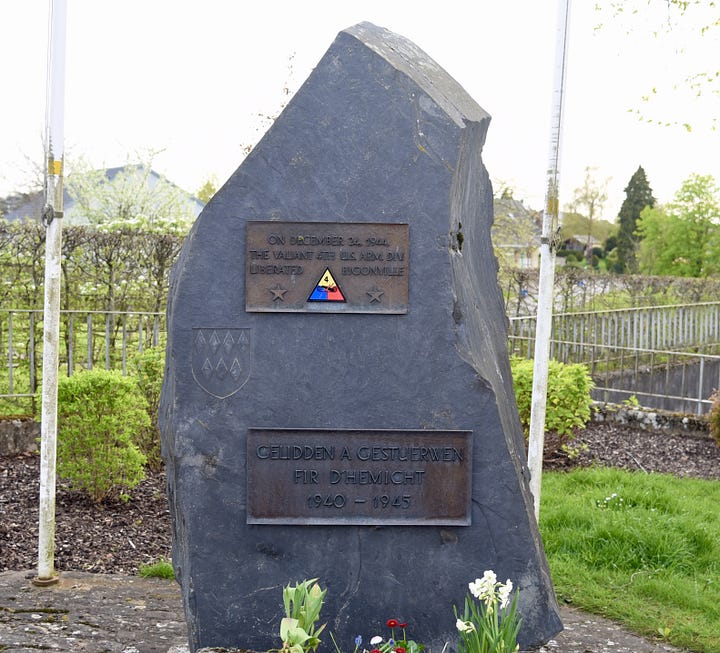
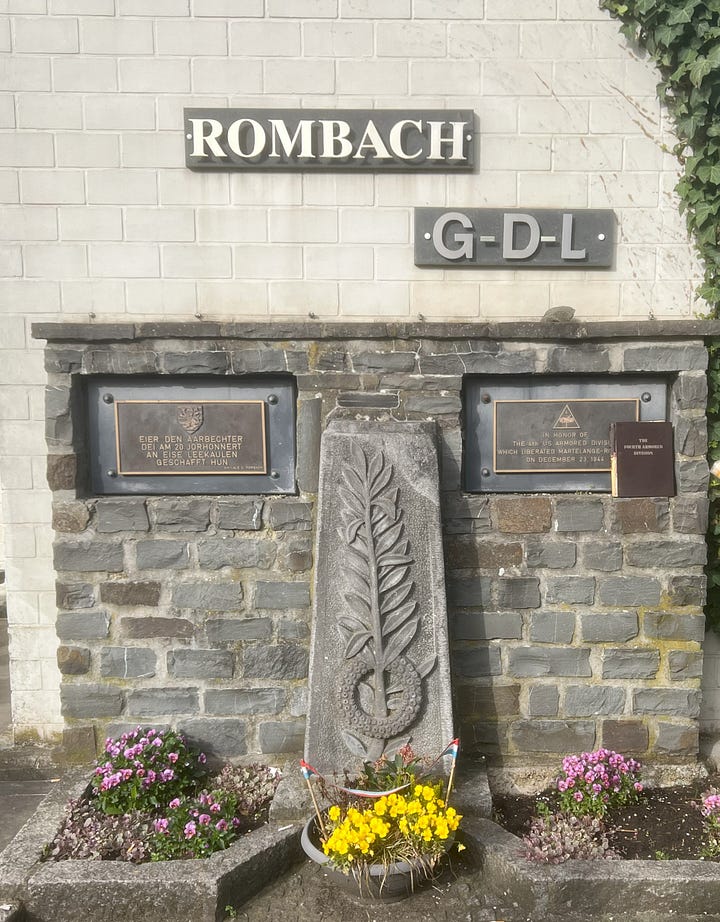
A Toast to those who have gone before.
Let us remember with a toast all of those who fought, bled, and died to give us the free world in which we live today.

But today, December 22, 2024, - eighty years after BGen McAuliffe sent his famous reply- let us call to mind in particular the cold, brave, underfed men from the 101st Division, 10th Armored Division, 705th Tank Destroyer Battalion and others who held out in horrendous conditions against a more powerful enemy force.
So now, let’s raise a glass and toast the memory of the Battered Bastards of Bastogne: NUTS!
Merry Christmas!
All the Best,
PGR
References and Sources:
Band Of Brothers by Stephen Ambrose, Simon & Schuster, 1992.
The story of the NUTS! reply. Kenneth J McAuliffe, www.army.mil




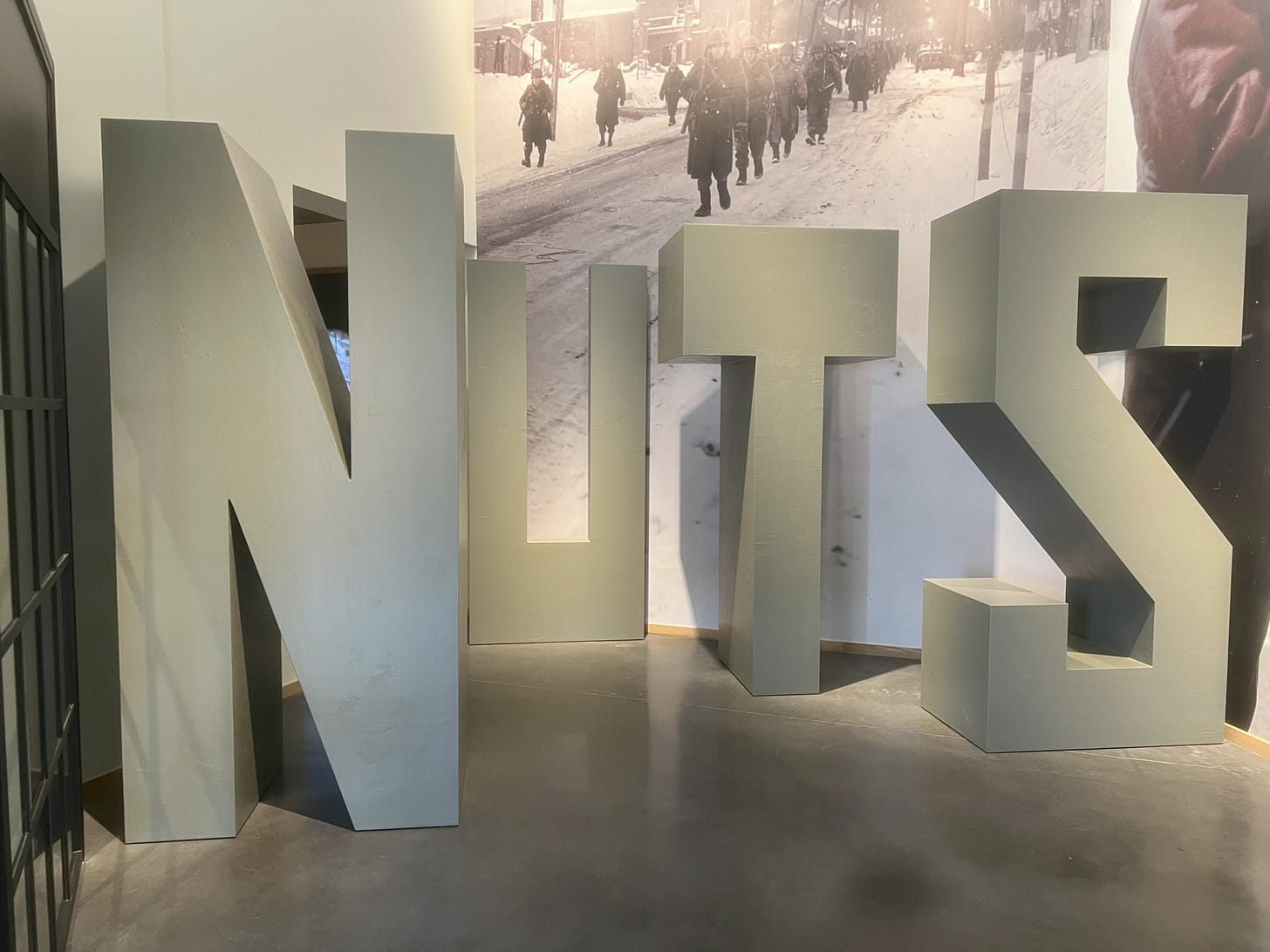

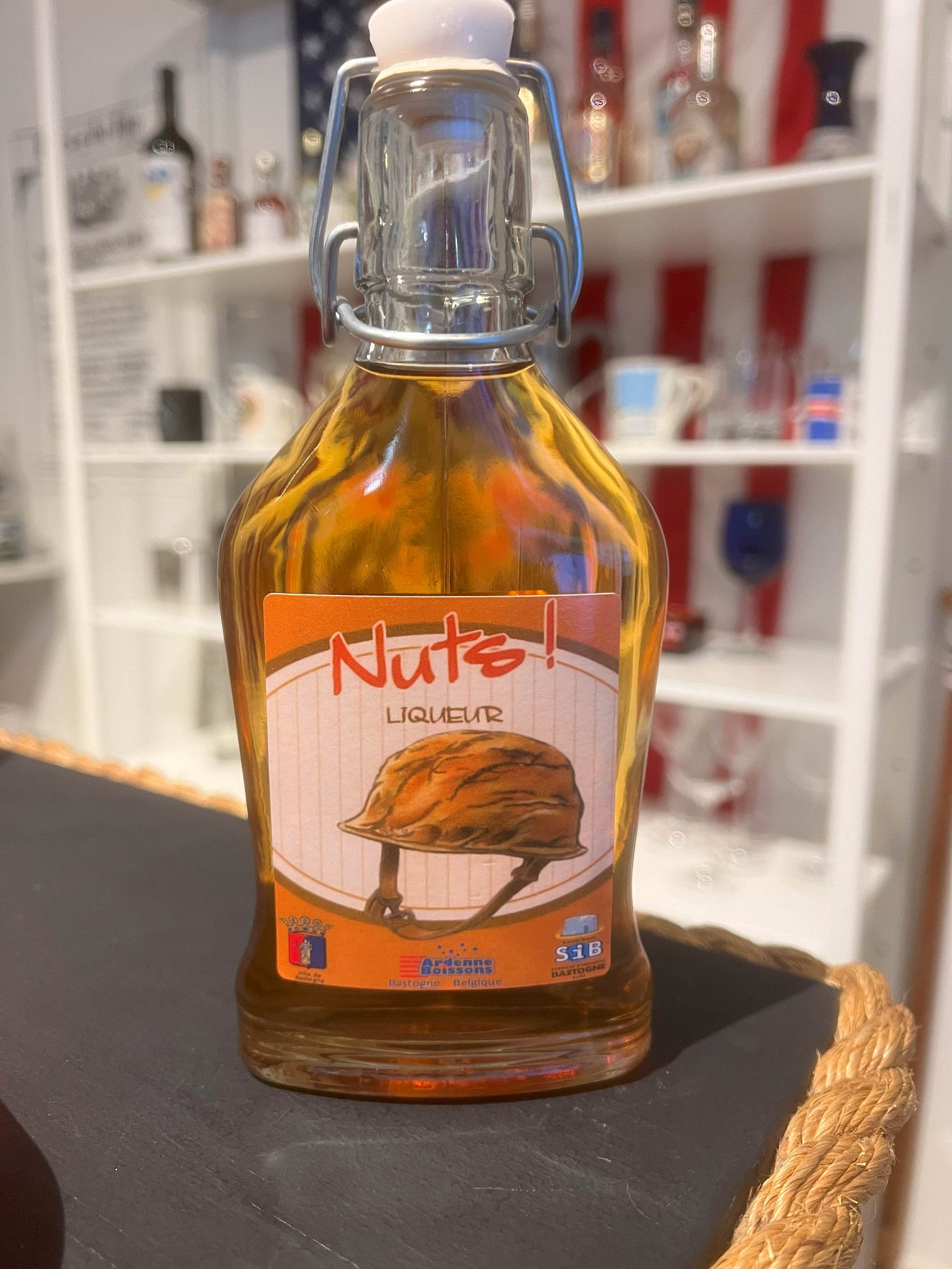
Always a great story. Harry Kinnard was my dad's boss in the 11th Air Assault/1st Cavalry Division. Hyvää Joulua!
NUTS!